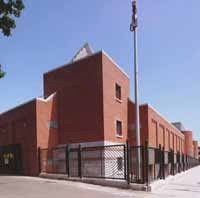Strip Searches at Dóchas
23rd November 2011
 Last night, the Minister for Justice made a
comprehensive statement in the Dáil about the shocking annual report of the Dóchas Centre
Visiting Committee, published last Friday (18th Nov 2011). While
the Minister reiterated the position of the Irish Prison Service that no women
were strip searched in front of male officers, he did accept that what had
happened in a strip search in November 2010, as recounted in the Visiting Committee
report, was unacceptable and that instructions had been issued to staff about
any future searches. The Minister also acknowledged that the manner in which another
woman prisoner had been ejected from the prison was “entirely unacceptable”.
Last night, the Minister for Justice made a
comprehensive statement in the Dáil about the shocking annual report of the Dóchas Centre
Visiting Committee, published last Friday (18th Nov 2011). While
the Minister reiterated the position of the Irish Prison Service that no women
were strip searched in front of male officers, he did accept that what had
happened in a strip search in November 2010, as recounted in the Visiting Committee
report, was unacceptable and that instructions had been issued to staff about
any future searches. The Minister also acknowledged that the manner in which another
woman prisoner had been ejected from the prison was “entirely unacceptable”.
While the Minister’s clarity on both of these violations of rights is very welcome, a number of important issues remain outstanding:
1. Transparency and Accountability
This controversy has only come to light because of the publication of the Visiting Committee’s Report, a full year after the incident took place (on 9th Nov 2010). We do not know if any complaints were made by prisoners about these incidents, but given that the current internal complaints system lacks any real credibility, it is quite possible that no prisoner made a formal complaint. This incident emphasises once again - and most emphatically - the need for proper accountability and an independent complaints system within the prison system, such as the effective Prison Ombudsman models in England and Wales, Scotland and in Northern Ireland.
Even though the Minister has now issued a full statement on what happened at the Dóchas Centre, we remain unaware of any staff or management being held to account, and we still do not know who ordered this search and/or who oversaw the search being conducted in this manner. The Government has plans to strengthen the Visiting Committee model, by bringing them under the Inspector of Prisons, and this seems like a good time to do so.
2. Deterioration of Dóchas Regime
The Visiting Committee Report also indicated a much deeper problem within the Dóchas Centre, reflecting a change in ethos and regime within the prison away from one that is primarily rehabilitative. The change to a more punitive regime is a pattern that has been witnessed by many professionals and agencies working in the prison over the last number of years. Where once the Dóchas Centre was a model of a successful women’s prison, put forward internationally as an example of best practice, now it seems that much of this progress has been lost.The Minister needs to seriously examine what is happening at Dóchas – and an internal review of these recent reports by prison management is not an effective way to get to the root of this change in culture.
3. More Effective Responses
This is also an appropriate time to reflect on where we are going with the imprisonment of women in Ireland more generally. The deterioration of the regime in the Dóchas Centre is undoubtedly linked to the exceptional levels of overcrowding in that prison over recent years, and more importantly, the very significant increase in the number of women who have been imprisoned over that period. (There has been an increase of more than 87% in the numbers of women sentenced to imprisonment since 2005, and a 19% increase in 2010 on 2009 numbers.)
In December 2009, the Women in Prison Reform Alliance made a submission to then Minister for Justice, Dermot Ahern calling for a full review of criminal justice policy towards women offenders in Ireland, which would look at alternatives to imprisonment and provision of open and alternative residential facilities for women offenders. In Ireland, we only have a medium security prison response to women offenders, even though internationally women are recognised posing far lower risk than male prisoners. Many good models exist for residential and therapeutic alternatives to prison for women; such programmes are cheaper, more effective and more capable of addressing the fact that a large proportion of women’s offending is linked to underlying causes such as mental health, addiction and experiences of abuse.
- IPRT Briefing on Women in Detention
- Inspector of Prisons: Women Prisoners' Supplement to Standards
- Revolving Doors: Counting the Cost
- Prison Reform Trust: Reforming Women’s Justice




